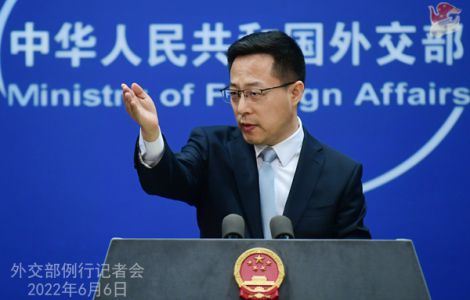中英对照:2022年6月6日外交部发言人赵立坚主持例行记者会
Foreign Ministry Spokesperson Zhao Lijian’s Regular Press Conference on June 6, 2022
应哈萨克斯坦副总理兼外长特列乌别尔季邀请,国务委员兼外长王毅将于6月6日至9日赴哈萨克斯坦出席“中国+中亚五国”外长第三次会晤,并对哈萨克斯坦进行正式访问。
Upon the invitation of Kazakhstan’s Deputy Prime Minister and Foreign Minister Mukhtar Tileuberdi, State Councilor and Foreign Minister Wang Yi will attend the third China+Central Asia (C+C5) foreign ministers’ meeting in Kazakhstan and pay an official visit to Kazakhstan from June 6 to 9.
总台央视记者请介绍王毅国务委员兼外长此次出席“中国+中亚五国”外长第三次会晤并对哈萨克斯坦进行正式访问的背景、有关考虑、活动安排。请问中方对此次访问有何期待?
CCTV Can you share with us the background, consideration and arrangements of State Councilor and Foreign Minister Wang Yi’s attendance at the third C+C5 foreign ministers’ meeting and the visit to Kazakhstan? What does China expect from this visit?
赵立坚中亚五国是中国的友好邻邦和战略伙伴。中国同中亚国家建交30年来,始终秉持相互尊重、睦邻友好、同舟共济、互利共赢原则,不断深化友好合作。今年1月,中国同中亚五国建交30周年视频峰会成功举行,习近平主席与五国元首共同擘画合作蓝图,宣布打造中国—中亚命运共同体。王毅国务委员兼外长此次出席“中国+中亚五国”外长第三次会晤,将同各方积极落实视频峰会成果,进一步深化中国同中亚国家间睦邻友好和各领域互利合作,共促发展、共谋繁荣。
Zhao Lijian The five Central Asian countries are friendly neighbors and strategic partners of China. For 30 years since the establishment of diplomatic ties, China and the Central Asian countries have been deepening friendly cooperation following the principle of mutual respect, good neighborliness and solidarity for win-win outcomes. In January this year, the Virtual Summit Commemorating the 30th Anniversary of the Establishment of Diplomatic Relations between China and the Five Central Asian Countries was successfully held. President Xi Jinping and the leaders of the five countries jointly drew the blueprint for cooperation and announced to forge a China-Central Asia community with a shared future. During the third C+C5 foreign ministers’ meeting, State Councilor and Foreign Minister Wang Yi will actively implement the outcomes of the virtual summit, and further deepen good neighborliness and mutually beneficial cooperation in various areas between China and the Central Asian countries for common development and common prosperity.
访问哈萨克斯坦期间,王毅国务委员兼外长将会见哈总统托卡耶夫,同副总理兼外长特列乌别尔季举行会谈。我们相信此访将进一步深化两国政治互信和务实合作,推动中哈高质量共建“一带一路”取得更大成效。
During his visit to Kazakhstan, State Councilor and Foreign Minister Wang Yi will meet with Kazakh President Kassym-Jomart Tokayev and hold talks with Deputy Prime Minister and Foreign Minister Mukhtar Tileuberdi. We believe this visit will further deepen political mutual trust and practical cooperation between the two countries, and work for more deliverables in high-quality Belt and Road cooperation.
《环球时报》记者美国国务卿布林肯在对华政策演讲中指责中国搞“胁迫外交”,请问中方对此有何评论?
Global Times US Secretary of State Antony Blinken accused China of conducting coercive diplomacy in his speech outlining the administration’s approach to China. What is China’s comment?
赵立坚中国从来不搞什么胁迫,也坚决反对其他国家搞胁迫。中国文化主张己所不欲、勿施于人。中国外交的传统之一就是大小国家一律平等。在中国国家主权和民族尊严遭到胁迫和侵害时,中方采取的措施是合理合法反制,捍卫的是国家正当权益,维护的是国际公平正义。中国从不以武力威胁他国,从不搞军事同盟,从不输出意识形态,从不跑到别人门口挑事,从不把手伸进别人家里。中国也不主动打贸易战,不无端打压他国企业,不搞霸凌制裁、长臂管辖。
Zhao Lijian China never coerces others, and we firmly oppose coercion by other countries. “Do not do to others what you don’t want others to do to you” -- this is a long-held Chinese cultural belief. One of the traditions in China’s diplomacy is that we believe all countries, big or small, are equal. When national sovereignty and dignity is under coercion or violation, China responds with reasonable and lawful countermeasures to defend its legitimate rights and interests and uphold international equity and justice. China never threatens other countries with force. We never form military coalition or export ideology. We never make provocations at others’ doorstep or reach our hands into others’ homes. We never wage trade wars or groundlessly hobble foreign companies. And we never bully, sanction or carry out long-arm jurisdiction.
美国是胁迫外交的始作俑者。胁迫外交的发明权、专利权、知识产权,都非美国莫属。1971年美国学者亚历山大提出胁迫外交概念,讲的就是美国对老挝、古巴、越南的政策。多年来,从武力威胁到政治孤立,从经济制裁到技术封锁,美国为实现一己私利,用实际行动向世界演绎了什么才是真正的胁迫外交。中国网民有句话,想要了解什么是胁迫外交,看看美国怎么做的就知道了。
Coercive diplomacy starts with the US. It is nobody else but the US that invented, patented and owns the intellectual property right of “coercive diplomacy”. In 1971, US scholar Alexander George coined the concept of “coercive diplomacy” to describe the US policy on Laos, Cuba and Vietnam. For years, from military threats to political isolation, from economic sanctions to technological blockade, the US has shown the world what “coercive diplomacy” is through what it has done. Some Chinese netizens have put it this way -- to know what “coercive diplomacy” entails, just check what the US has done.
美方常说“从实力地位出发”与别国打交道,实际就是谁力气大、胳膊粗谁说了算,难道这不是胁迫外交?美方不择手段打压中国华为、法国阿尔斯通、日本东芝等公司,又逼迫台积电、三星等企业交出芯片供应链数据,难道这不是胁迫外交?美方在俄乌冲突中逼迫各国选边站队,动辄以单边制裁和长臂管辖相威胁,难道这不是胁迫外交?中国和所罗门群岛在相互尊重、平等互利基础上签署安全合作协议,美国立刻派人跑到南太岛国施压、威逼阻止这些国家同中国正常合作,难道这不是胁迫外交?
The US keeps talking about dealing with other countries from a position of strength. This, in effect, means whoever has a bigger fist calls the shots. Isn’t this “coercive diplomacy”? The US spared no effort to crack down on China’s Huawei, France’s Alstom and Japan’s Toshiba and coerced the TSMC, Samsung and other companies to provide to the US chip supply chain data. Isn’t this “coercive diplomacy”? The US forced countries to take sides in the conflict between Russia and Ukraine and wantonly threatened to impose unilateral sanctions and long-arm jurisdiction. Isn’t this “coercive diplomacy”? After China and Solomon Islands signed the security cooperation agreement on the basis of mutual respect, equality and mutual benefit, the US immediately sent officials to South Pacific island countries in an attempt to exert pressure on and intimidate them, and stop them from having normal cooperation with China. Isn’t this “coercive diplomacy”?
布林肯国务卿说,所有国家都要在不受胁迫的情况下自由地规划自己的道路。要做到这一点,首先需要美国改掉搞胁迫外交的老毛病,停止干涉别国内政,停止强迫别国选边站队,停止滥用单边制裁,停止打压别国高科技企业。中国愿同所有主持正义的国家一道,共同反对世界上的各种胁迫行为。
Secretary Blinken said that “all countries will be free to chart their own paths without coercion”. For that to happen, the US must first and foremost change its old habit of pursuing “coercive diplomacy”, stop interfering in the internal affairs of others, stop forcing countries to pick sides, stop abusing unilateral sanctions and stop hobbling hi-tech companies of other countries. China is ready to work with all countries upholding justice to stand against various coercive behaviors in the world.
新华社记者美国国务院6月2日发布“2021年度国际宗教自由报告”,罗列所谓中方限制和侵犯宗教自由“罪状”,声称新疆、西藏、香港存在违反和限制宗教信仰自由问题。美国务卿布林肯在报告发布会上发表讲话称,中国继续对以穆斯林为主的维吾尔族人和其他宗教少数群体实施“种族灭绝”和镇压。请问中方对此有何评论?
Xinhua News Agency On June 2, the US State Department released the 2021 International Religious Freedom Report in which the US listed China’s “abuses” and “restrictions” of religious freedom and claimed that “abuses” and “restrictions” of freedom of religious belief exist in Xinjiang, Tibet and Hong Kong. Secretary of State Antony Blinken said in a speech at an event releasing the report that “China continues its genocide and repression of predominately Muslim Uyghurs and other religious minority groups”. Do you have any comment?
注:为确保中英对照准确,“热词译”网站可能对中英文重新分段。

